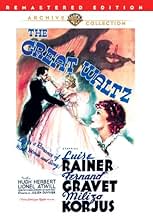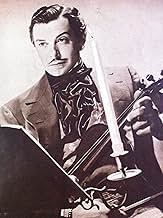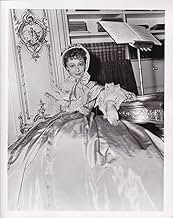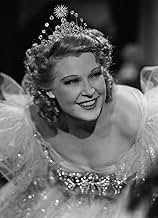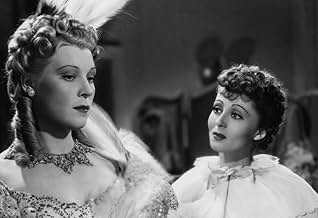CALIFICACIÓN DE IMDb
6.4/10
1.4 k
TU CALIFICACIÓN
En la Viena de 1845, Johann Strauss II prefería escribir e interpretar valses a cualquier otra cosa, en una época en la que el vals no se consideraba música de sociedad. Tras ser despedido d... Leer todoEn la Viena de 1845, Johann Strauss II prefería escribir e interpretar valses a cualquier otra cosa, en una época en la que el vals no se consideraba música de sociedad. Tras ser despedido de su trabajo decide seguir su pasión.En la Viena de 1845, Johann Strauss II prefería escribir e interpretar valses a cualquier otra cosa, en una época en la que el vals no se consideraba música de sociedad. Tras ser despedido de su trabajo decide seguir su pasión.
- Dirección
- Guionistas
- Elenco
- Ganó 1 premio Óscar
- 2 premios ganados y 3 nominaciones en total
Fernand Gravey
- Johann Strauss
- (as Fernand Gravet)
Sig Ruman
- Wertheimer
- (as Sig Rumann)
Ernie Alexander
- Revolutionary
- (sin créditos)
Opiniones destacadas
This fictional account of Johann Strauss' life is highlighted by one of the most exquisite scenes in musical history--far from real of course--in which the composer and an operatic diva are driven through the woods in horse and buggy while the countryside comes alive with the sound of music. The pastoral beauty of the scene itself combined with the intricate way 'Tale of the Vienna Woods' is woven into the musical scene (as composer Strauss begins humming the tune along with his diva friend) is just one of the charming highlights of this MGM musical.
Swirling waltzes are captured with such superb angles in the Oscar-winning camerawork, it's no wonder David O. Selznick was impressed enough to insist that his own technical staff derive inspiration from viewing the film.
Soprano Miliza Korjus does some excellent trills as the operatic diva who steals Strauss from his wife (temporarily) until the obligatory happy ending. Luise Rainer suffers gracefully (in an insufferable role as the wife!!) and Fernand Gravet does well as the composer. His scenes with Miliza Korjus are what makes the film the gem that it is. She all but steals the film and was nominated for a Supporting Actress Oscar and then disappeared from the American scene, returning to Europe to resume her operatic career.
Swirling waltzes are captured with such superb angles in the Oscar-winning camerawork, it's no wonder David O. Selznick was impressed enough to insist that his own technical staff derive inspiration from viewing the film.
Soprano Miliza Korjus does some excellent trills as the operatic diva who steals Strauss from his wife (temporarily) until the obligatory happy ending. Luise Rainer suffers gracefully (in an insufferable role as the wife!!) and Fernand Gravet does well as the composer. His scenes with Miliza Korjus are what makes the film the gem that it is. She all but steals the film and was nominated for a Supporting Actress Oscar and then disappeared from the American scene, returning to Europe to resume her operatic career.
Sandwiched,in Duvivier's oeuvre,between two absolute masterpieces "Un carnet de Bal" and the overlooked "La fin du Jour" (some kind of French "Sunset Blvd" ) where the director's pessimism reaches new heights ,"The great waltz " ,unlike another movie made in Hollywood "Flesh and fantasy" cannot be looked upon as a "film d' Auteur".
It's impersonal but it nevertheless displays Duvivier's extraordinary eclecticism."The great waltz" is a good work,made with care and taste and shows that Duvivier could have been a great musicals director,if he had wanted to.Half of the movie consists of instrumentals or songs,which makes sense,for it is a movie dealing with Strauss's life.His private life does not interest that much Duvivier who avoids the traps of a linear biography.However,there are snatches of melodrama towards the end,mainly in the scenes between the moving Luise Rainer and Miliza Korjus in the theater.Fernand Gravey (spelled "Gravet" in the cast and credits)is the only French actor here.He had begun his American career with Mervyn LeRoy in 1937.
All the musical scenes are dazzling ;the "blue Danube" treatment is excellent,a waltz which would be used by dozens of directors,from Renoir ("Boudu Sauvé des Eaux" ) to Kubrik ("2001" ) to Cimino ("Heaven's gate"). Other good sequence: Strauss composing a new tune while he is hearing a horse' s trot.
It's impersonal but it nevertheless displays Duvivier's extraordinary eclecticism."The great waltz" is a good work,made with care and taste and shows that Duvivier could have been a great musicals director,if he had wanted to.Half of the movie consists of instrumentals or songs,which makes sense,for it is a movie dealing with Strauss's life.His private life does not interest that much Duvivier who avoids the traps of a linear biography.However,there are snatches of melodrama towards the end,mainly in the scenes between the moving Luise Rainer and Miliza Korjus in the theater.Fernand Gravey (spelled "Gravet" in the cast and credits)is the only French actor here.He had begun his American career with Mervyn LeRoy in 1937.
All the musical scenes are dazzling ;the "blue Danube" treatment is excellent,a waltz which would be used by dozens of directors,from Renoir ("Boudu Sauvé des Eaux" ) to Kubrik ("2001" ) to Cimino ("Heaven's gate"). Other good sequence: Strauss composing a new tune while he is hearing a horse' s trot.
A perfect and absolute delight from beginning to end. The great music of Johann Strauss is performed in such beautiful, elaborate settings! MGM reproduced Vienna and the era perfectly. It is too bad this was the only film in which Miliza Korjus appeared. Such a magnificent voice and charming personality! The carriage ride in the Vienna Woods and that final, unbelievable, note she holds for what seems like eternity are never to be forgotten. Luise Rainer is wonderful and could always convey such emotion without ever uttering a word. Perfect casting, with so many great character actors in supporting roles.
Before I started these comments, I first read many of the others made by a wide range of people - I was amazed to find that some were reading far too much into the storyline,( which everyone who has seen the movie knows it is pure hokum) or belittling the film for its treatment of the life of Johann Strauss. Why not go and see it, and enjoy the sheer entertainment of the Music, the acting of Luise Rainer, the voice of Miliza Korjus (who will ever forget her rendition of "One Day When We Were Young" - who cares if Strauss did or did not write it!), So "The Tales from the Vienna Woods" was written overnight - does it matter that free licence was taken, surely the name of the game is to entertain, and this film does that. Hugh Herbert and Lionel Atwill add fun and spice to one of the more entertaining musicals of the 1930's.
10Esierra2
I own a VHS copy of The Great Waltz. I have seen this movie I don't know how many times! I was very young when I saw the movie for the first time, and it made a great impact on me and ever since then, I feel the urge to look and hear the magnificent singer and actress that, in my opinion takes the first place in this movie: MILIZA KORJUS. I have managed to collect ALL her recordings, I think., but I never saw the movie as a political issue or as they say here, as anti Nazi film! Nothing of the sort! To me it's a delightful movie and a great vehicle for the display of the many talents of Miliza Korjus and also for the rest of the cast and the romanticism involved in the whole movie.
¿Sabías que…?
- TriviaToscha Seidel, the Russian virtuoso violinist, was hired especially to dub the solos on the soundtrack for Johann Strauss (Fernand Gravey) and began a new career working as a concert master at MGM and other studios.
- Citas
Johann 'Schani' Strauss II: Thanks for firing me, Mr. Wertheimer. Goodbye, you worms!
- ConexionesFeatured in Another Romance of Celluloid (1938)
- Bandas sonorasTales From the Vienna Woods, Op.325
(1868) (uncredited)
Music by Johann Strauss
Lyrics by Oscar Hammerstein II
Hummed by Fernand Gravey as it is being composed
Sung by Miliza Korjus
Played as background music often
Selecciones populares
Inicia sesión para calificar y agrega a la lista de videos para obtener recomendaciones personalizadas
- How long is The Great Waltz?Con tecnología de Alexa
Detalles
- Tiempo de ejecución1 hora 44 minutos
- Color
- Relación de aspecto
- 1.37 : 1
Contribuir a esta página
Sugiere una edición o agrega el contenido que falta

Principales brechas de datos
By what name was El gran vals (1938) officially released in India in English?
Responda

